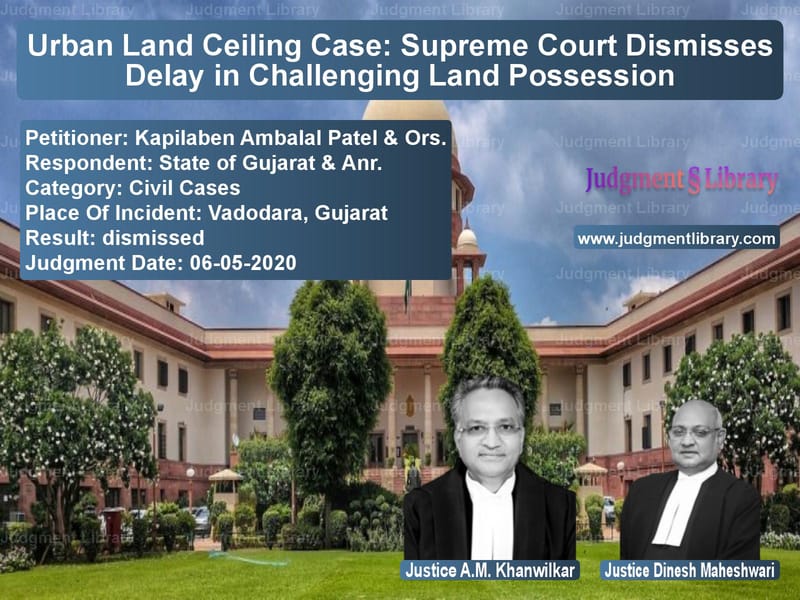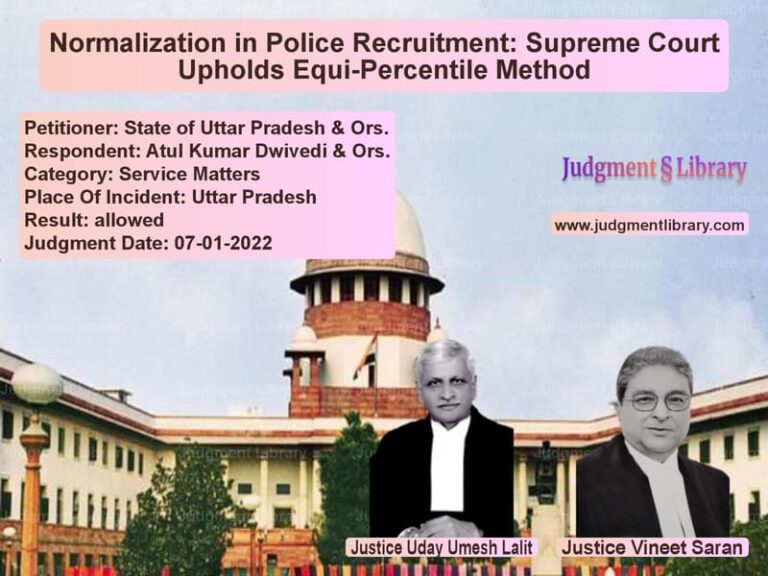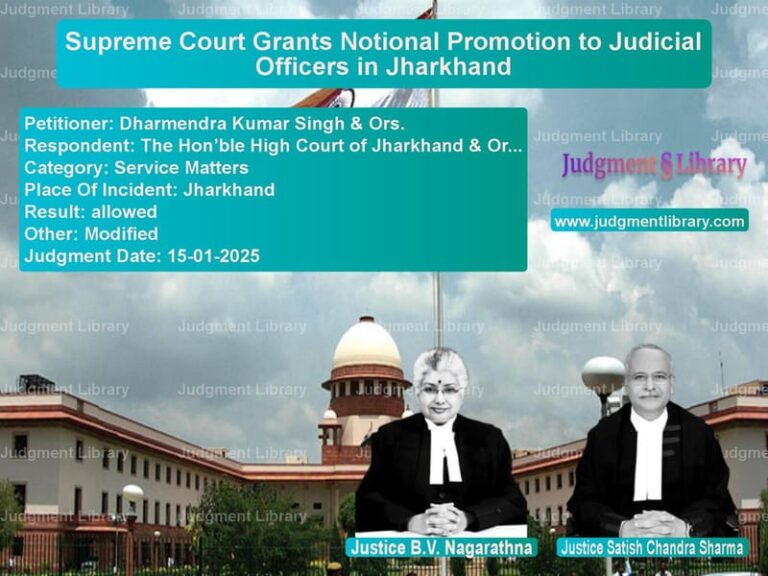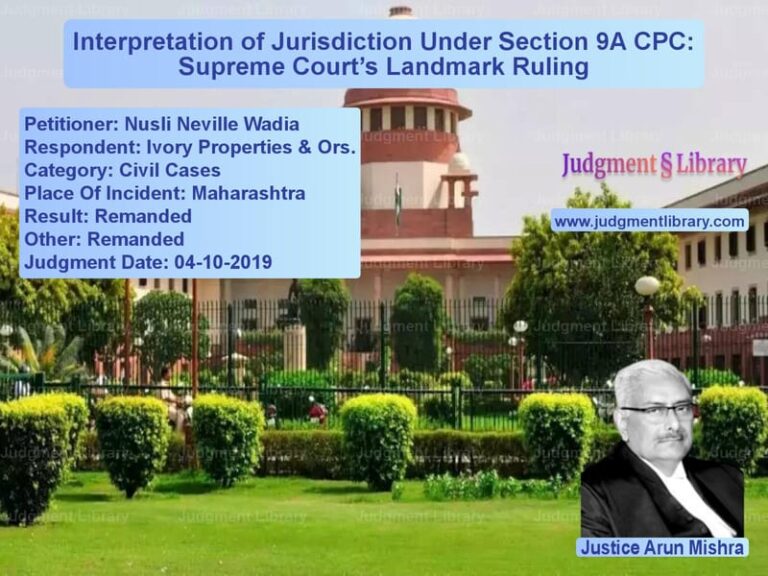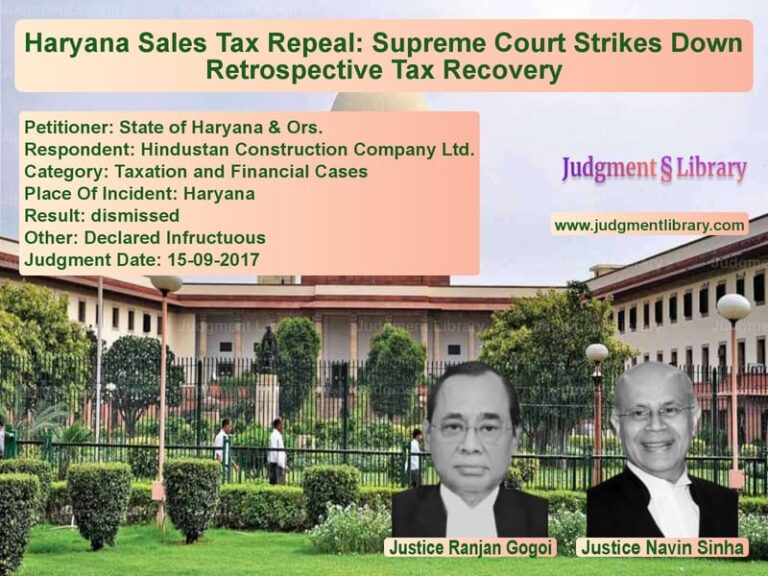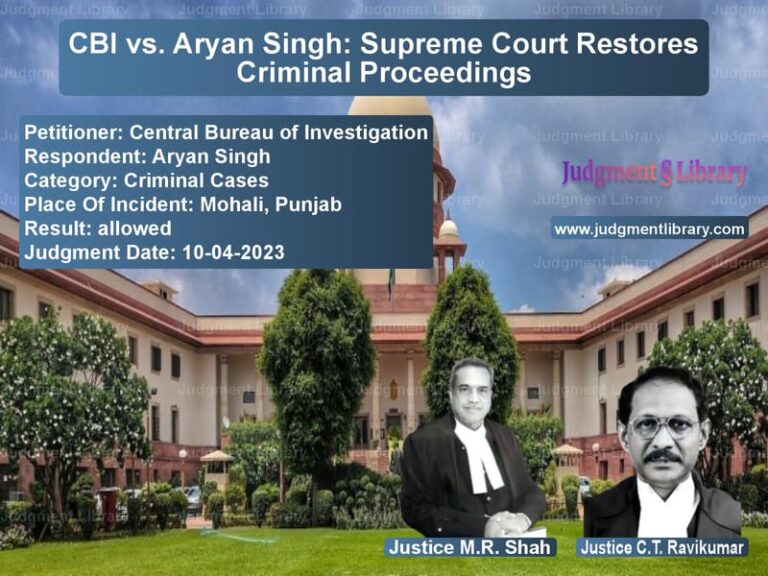Urban Land Ceiling Case: Supreme Court Dismisses Delay in Challenging Land Possession
The case of Kapilaben Ambalal Patel & Ors. vs. State of Gujarat & Anr. involves a dispute over land possession under the Urban Land (Ceiling and Regulation) Act, 1976. The Supreme Court examined whether the landowners’ challenge to the possession taken by the government was valid, considering the delay of over 14 years in filing the writ petition.
Background of the Case
The dispute concerned land in Vadodara, Gujarat, originally owned by Parsottambhai Patel, who passed away on January 28, 1976. His legal heirs, including five sons, filed statements under Section 6 of the Urban Land Ceiling Act, disclosing their holdings. The authorities later declared 12,385 square meters of land as surplus and initiated proceedings under the 1976 Act to acquire the land.
On March 20, 1986, the State authorities prepared a Possession Panchnama, claiming to have taken over the land. The petitioners, however, alleged that this was only a ‘paper possession’ and that they continued to occupy the land.
Key Issues
- Was the writ petition challenging the Possession Panchnama filed within a reasonable time?
- Did the government follow proper legal procedures in acquiring the land?
- Did the petitioners lose their rights under the Urban Land (Ceiling and Regulation) Repeal Act, 1999?
Arguments of the Petitioners (Kapilaben Ambalal Patel & Ors.)
The petitioners contended that:
- The government had taken only ‘paper possession’ and not actual physical possession.
- They remained in occupation of the land, as evidenced by revenue records.
- The land acquisition process was flawed because notices were not served to all landowners.
- Under the Repeal Act of 1999, all pending proceedings should have abated, and the land should have remained with them.
Arguments of the Respondents (State of Gujarat & Anr.)
The State argued that:
- The Possession Panchnama of March 20, 1986, clearly recorded that possession was taken over.
- The landowners were served with notices under Section 10(5) of the 1976 Act before possession was taken.
- The land was already vested in the government before the 1999 Repeal Act, meaning the repeal had no effect on this case.
- The petitioners waited for 14 years before filing the writ petition, making their challenge legally untenable due to delay and laches.
Supreme Court’s Judgment
The Supreme Court dismissed the petition, holding that the delay of 14 years in challenging the Possession Panchnama was inexcusable. The Court made the following key observations:
1. Delay of 14 Years Makes the Petition Invalid
The Court ruled that the writ petition suffered from inordinate delay and laches, making it unsustainable:
“The discretionary relief under Article 226 can be had provided one has not by his act or conduct given a go-by to his rights. Equity favours a vigilant rather than an indolent litigant.”
2. Possession Panchnama Was Valid
The Court held that the government had taken valid possession under the law:
“Once possession has been taken and recorded in the Possession Panchnama, subsequent entries in the revenue record do not create any right in favour of the landowners.”
3. The Repeal Act Did Not Apply
The Court noted that the Repeal Act of 1999 did not help the petitioners because possession was taken long before the repeal:
“The repeal of the 1976 Act does not benefit landowners in cases where possession has already been taken by the government.”
4. Legal Proceedings Were Final
The Court held that the petitioners had exhausted all legal remedies and had no further grounds to challenge the acquisition:
“The orders rejecting their applications under Section 21 and other proceedings had attained finality, and the petitioners cannot reopen settled issues after a prolonged delay.”
Impact of the Judgment
This ruling has significant implications for land acquisition disputes:
- It reinforces that landowners must challenge government actions within a reasonable timeframe.
- It upholds the legal principle that once land possession is taken, subsequent repeal of the law does not undo past acquisitions.
- It ensures that government land acquisition cannot be challenged indefinitely through delayed litigation.
Conclusion
The Supreme Court’s judgment in Kapilaben Ambalal Patel vs. State of Gujarat confirms that long delays in challenging government actions will not be entertained. The decision sets a precedent that landowners must act promptly if they wish to contest land acquisitions, reinforcing legal certainty in property disputes.
Petitioner Name: Kapilaben Ambalal Patel & Ors..Respondent Name: State of Gujarat & Anr..Judgment By: Justice A.M. Khanwilkar, Justice Dinesh Maheshwari.Place Of Incident: Vadodara, Gujarat.Judgment Date: 06-05-2020.
Don’t miss out on the full details! Download the complete judgment in PDF format below and gain valuable insights instantly!
Download Judgment: Kapilaben Ambalal Pa vs State of Gujarat & A Supreme Court of India Judgment Dated 06-05-2020.pdf
Direct Downlaod Judgment: Direct downlaod this Judgment
See all petitions in Property Disputes
See all petitions in Contract Disputes
See all petitions in Public Interest Litigation
See all petitions in Landlord-Tenant Disputes
See all petitions in Damages and Compensation
See all petitions in Judgment by A M Khanwilkar
See all petitions in Judgment by Dinesh Maheshwari
See all petitions in dismissed
See all petitions in supreme court of India judgments May 2020
See all petitions in 2020 judgments
See all posts in Civil Cases Category
See all allowed petitions in Civil Cases Category
See all Dismissed petitions in Civil Cases Category
See all partially allowed petitions in Civil Cases Category

